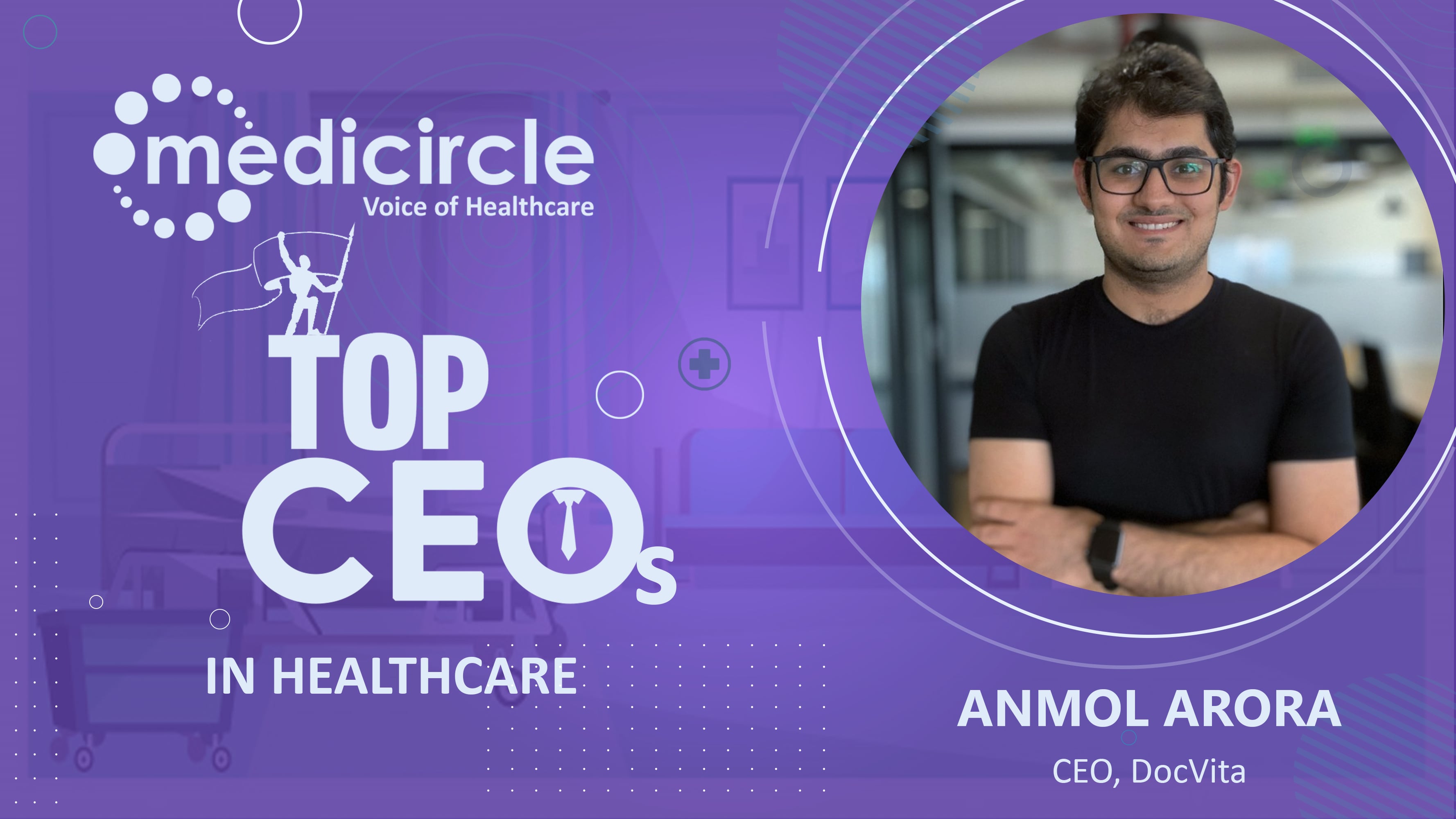After the global community was impacted by severe pandemic, the importance of healthcare and healthcare technology field is felt more than ever before. In recent years, healthcare has become an integral part of the business ecosystem in India. While healthcare itself is a noble profession, and majorly contributes to humanity. The successful healthcare entrepreneurs are making a valuable contribution to the national economies around the world. Medicircle presents top CEOs of the healthcare series where we are featuring healthcare CEOs who are influential role models to share the views about the future of the healthcare industry.
Mr. Anmol Arora is an IITan and is a CEO, DocVita, which is a telemedicine platform to consult with India's top doctors and specialists under the same roof. He has also been a founder and CEO at Chota Hospital Private Limited, Indore.
Quality is also a Challenge
Anmol says, “During this COVID-19 pandemic, healthcare has taken centre stage. On everyone's mind, immunity and health is at the forefront. People don’t sit on problems now; they immediately try to find solutions. So, when it comes to solving pandemic challenges, I think people as well as awareness will play a major role.
Apart from three cornerstones challenges of healthcare (Affordability, Availability and Accessibility) there's one more challenge that isn't talked about very often, which is quality of health care delivered. Many people don't know that Indians die more of poor quality than with lack of health care access. It is utmost important that we talk about affordability, availability, and accessibility and not compromising quality.”
Start-ups to Deliver Quality
Anmol talks about Innovation happening in the country. “Technology Start-ups are empowering Healthcare system to deliver quality of health care. There are start-ups which are solely focused on building infrastructure for telehealth, building infrastructure for clinics and hospitals. National Digital Health Mission (NDHM) has the potential for all MedTech to collaborate and deliver accessibility to the whole of India which will lead to meaningful implementation of Technology and Awareness.”
Anmol adds, “Healthcare will become more affordable when healthcare providers of a country will manage their costs. Because, they can't function without a proper cash flow. So, they've to manage costs. Some costs that really drive apart healthcare and pricing are obviously expensive equipment, high operational costs, high administrative expenses, and some expensive drugs. This makes treatments not affordable. But now it’s been observed that a lot of Indian Med Tech companies are coming up with the reduced cost of equipment and pharmaceuticals. So, the right Government, and Innovators Collaboration can solve the problem of affordability in our Country.”
Prioritising the Convenience of People
Anmol shares, “When COVID 19 hit, telehealth came into the picture and then we thought of listing Doctors on our platform. We were not only making healthcare more accessible and available but helping doctors to manage the infrastructure better. We're seeing a lot of word of mouth happening of our infrastructure. One thing that we tried to build different from other platforms is that most people want the convenience of what they have available at hand. For example, if somebody does not have the doctor app, they can consult Doctor on WhatsApp as long as they get access to a quality doctor, get prescribed and treated. People want to feel comfortable. And I think we have prioritized that since day one at DocVita.”
Anmol adds, “Recently we have introduced Payments Solutions for doctors. We just made it very seamless for them. It was like sort of their own payment gateway. So, we have empowered doctors to accept payments from their patient using any payment mode that's comfortable to the patient.”
We should see the Good Side of Pandemic
Anmol emphasizes, “Apart from Online, Offline experience has also been impacted. Now Doctors want to make themselves more accessible to patients, they want to be more available for their patients. And because the competition is growing, I think that is the trend that’s going to surge. In fact, we have some of the doctors on our platform who want to inspire their patients to be healthy. And that's the right step in the right direction. In future there can be interoperable healthcare infrastructure so that your medical records can get seamlessly transfer between the two places. This Pandemic has accelerated the importance of physical and mental health. People have started realising the value of health,” says Anmol.
Strategies for Better Future
Anmol stresses, “India has significant cost advantages. And we can outperform best in terms of cost without compromising the outcome. We might actually achieve that within our budget. If we are increasing allocation of GDP into healthcare, there has to be meaningful impact of allocation. A lot of systems are interconnected; thus, impact can also get measured. And I think now we are more equipped to do this than ever, because sitting in a single control room, probably healthcare department can have the access to what's happening all across the board, clinics, on primary health department. Thus, we will be able to measure and demonstrate improvements and can also find out where we need to invest to improve more.”
(Edited by Renu Gupta)

 “National Digital Health Mission (NDHM) has the potential for all MedTech to collaborate and deliver accessibility to the whole of India which will lead to a meaningful implementation of Technology and Awareness,†says Anmol Arora, CEO, DocVita.
“National Digital Health Mission (NDHM) has the potential for all MedTech to collaborate and deliver accessibility to the whole of India which will lead to a meaningful implementation of Technology and Awareness,†says Anmol Arora, CEO, DocVita.




.jpeg)
.jpeg)
.jpeg)

.jpeg)
.jpeg)
_(1)_(1)_(1).jpeg)
_(1).jpeg)
.jpeg)






.jpeg)

.jpeg)

.jpeg)
.jpeg)

.jpeg)




